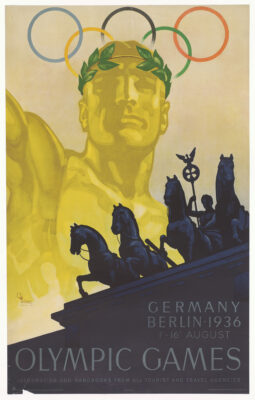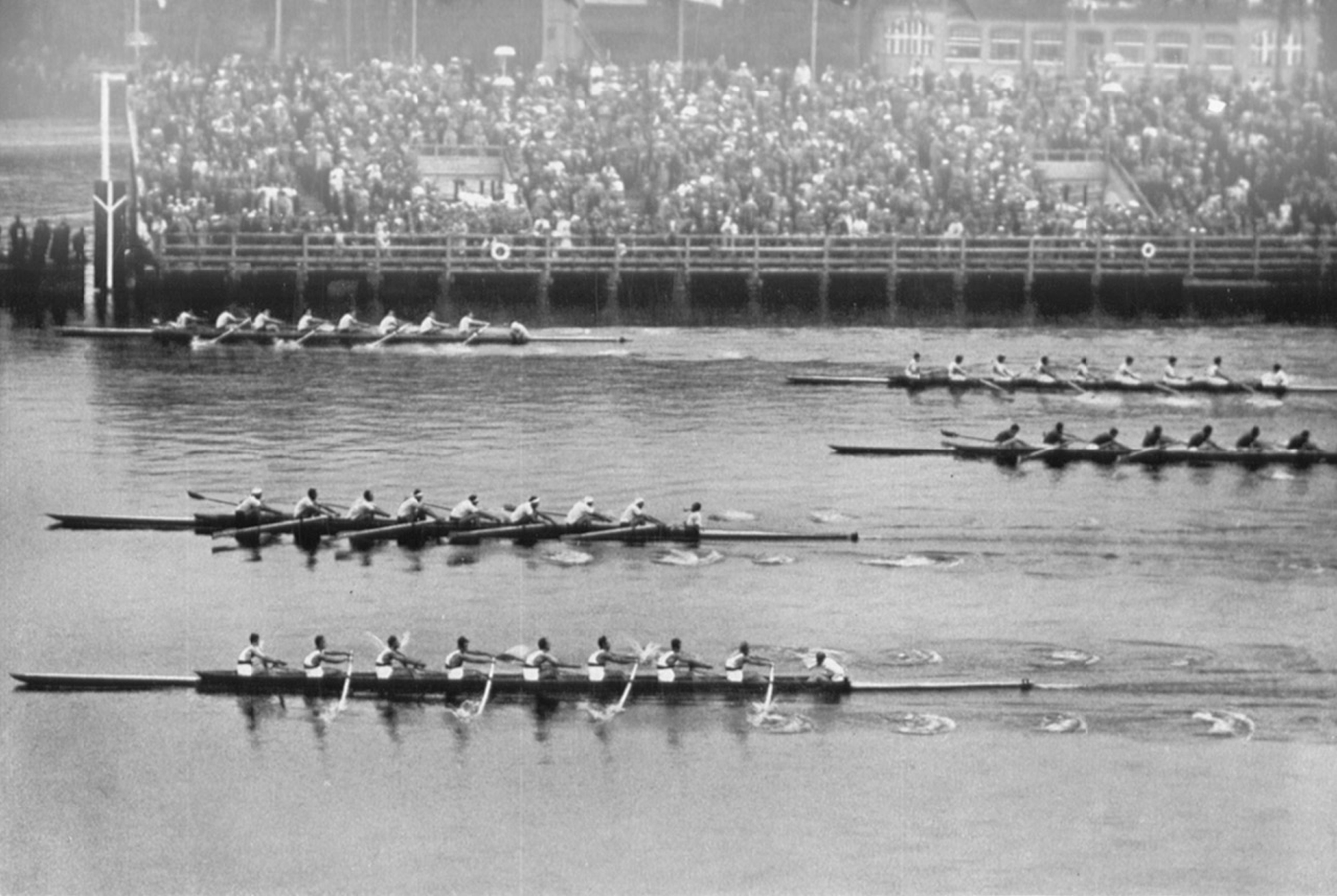After watching and admiring George Clooney’s movie, “The Boys in the Boat,” I came home and put on “Olympia,” Leni Riefenstahl’s brilliant, controversial documentary on the 1936 Nazi-hosted Olympics in Berlin. The documentary revealingly captures the rowing triumph of a team from the University of Washington.
We first see a team from Germany winning in the four-man shell competition. The young Germans freeze in a Heil Hitler salute. Then, as the eight-man race gets underway, Riefenstahl’s cameras focus on the duel between Germany and Italy. The English language commentator then shouts: “And here comes America.”
The UW team surges to win by a nose. The cameras record a scene of unrestrained joy as the wreath is passed between team members.
The Olympics had been designed as a showpiece for the Third Reich. The Olympic torch was carried, for the first time, from Athens to the site of the games. Athletes were greeted by a new Olympic hymn composed by Richard Straus. The Nazi regime’s antisemitic campaigns were, for a time, put on hold. The virulent newspaper Der Sturmer disappeared from kiosks in Berlin.
I wandered through Werner Mach’s Berlin Olympic Stadium a few years ago and stood on the VIP platform. This was the place where Adolf Hitler had basked in the crowd’s adulation. The French athletes gave him the Nazi salute.
By contrast, the American flag did not dip. United States athletes gave the Fuhrer a simple eyes-right. Below the box, Jesse Owens would set a long-jump record not equaled for thirty-two years. Hitler would not shake his hand.

In Riefenstahl’s documentary, Americans upstage their hosts.
She focuses on Owens as he wins four gold medals, and on exertions of decathlon winner Glenn Morris. (Leni claimed of having a brief dalliance with Morris.) The University of Washington crew and U.S. divers get featured, along with a medal ceremony showing three American flags being raised.
As well, there is a protest. Sohn Kee-chung became the first ethnic Korean to win an Olympic medal, triumphing in the marathon. He had to compete under the name of Kitei Son as a member of the Japanese delegation since Korea was occupancy rule of the Empire of Japan at the time.
Sohn and bronze medalist Nam Sung-young stood with their heads bowed at the medals ceremony, refusing to acknowledge the Japanese anthem and flag.
Sohn would get his country back. He later become vice chairman of the Korean Sport and Olympic Committee and was given the honor of carrying the Olympic torch into the stadium at the opening of the 1988 Seoul Olympics.
There was a drive for America to boycott the 1936 Olympics, rooted in Nazi persecution of Germany’s Jews. But the president of the U.S. Olympic Committee, Avery Brundage, successfully pressed the case for going.
He would chair the International Olympic Committee for twenty years. He would insist that the 1972 Munich Olympics proceed, even after terrorists murdered eleven Israeli athletes. Said Brundage: “The Games must go on.”
On the eve of the 1936 games, however, the only two Jews on the U.S. track team – Marty Glickman and Sam Stoller – were excluded from the American four hundred meter relay team. Glickman would insist for years that their removal was done by Brundage to avoid embarrassing Hitler. The runners substituted – Owens and Ralph Metcalfe – were both Black.
Avery Brundage spent decades preaching against the “politicization” of the Olympics. In 1980, however, five years after his death, the Carter administration chose to boycott the Moscow Olympics in protest against the Soviet Union’s invasion of Afghanistan. Sixty-six other countries chose not to participate. In turn, the Soviets and their puppet states boycotted the 1984 Olympics in Los Angeles.
Debate over host cities has never ceased. Athletes have long argued that boycotts constitute a punch in the gut for those who have endured grueling preparation. Calls to move the Olympics arose again when, prior to the 2014 Winter Olympics in Sochi, Russia enacted a law banning distribution of “propaganda of non-traditional sexual relationships” among minors. The response saw numerous a coming out by numerous LGBTQ+ athletes. The Obama administration responded by putting past gay medalists on the U.S. delegation to the games.
Another issue, long winked at, has been the use of performance-enhancing drugs, particularly by East German and Soviet athletes before the end of the Cold War.
Finally, after Sochi, the World Anti-Doping Agency detailed how Russia’s Olympic athletes engaged in state-sponsored doping. The IOC proceeded to strip medals from Russian athletes and suspend the Russian Olympic Committee.
Russia’s athletes have since been allowed to compete independently with no official delegation or Russian flag displayed at opening ceremonies.
Beijing hosted the 2008 Summer Olympics and 2022 Winter Olympics, each with opening and closing ceremonies featuring goose-stepping soldiers and a martial display of Chinese nationalism. Dissidents were detained or sent away from the city. Director Danny Boyle (“Slumdog Millionaire”) designed the opening ceremonies of the 2012 London Olympics to offer a contrast.
Sir Paul McCartney led a sing-long of “Hey Jude” and a stuntman dressed as Queen Elizabeth II parachuted into the Olympic stadium from a helicopter.
Washington has enjoyed an outsized presence in the Olympics orbit.
The Seattle Post-Intelligencer listed the 1936 UW crew victory as our region’s greatest 20th Century sporting event. Short track speed skater Apolo Ohno, the pride of Federal Way, became the most decorated American in Winter Olympics history. Phil and Steve Mahre, brothers from White Pass, won gold and silver medals in slalom at the 1984 Winter Olympics at Sarajevo.
Phil Mahre was the U.S. torch bearer carrying the Olympic torch across the border for the 2010 Vancouver Winter Olympics.
One of our boys delivered a comeuppance to the arrogant, autocratic Avery Brundage. During a Senate Commerce Committee hearing, Senator Warren Magnuson, D‑Wash., called Brundage to the witness stand as “Mr. Average Brundy.” Aides insisted it wasn’t the usual Maggie blooper, but intentional.
Daniel James Brown’s acclaimed book, “The Boys in the Boat,” portrays the Depression-era guys who came out of Montlake to win gold medals on the world stage… as well as the setting of their triumph. Chillingly, the reader learns that Jewish families living near the race venue were later deported and executed.
A second book, “The Nazi Olympics,” by Richard Mandell, memorably describes opening ceremonies, athletic achievements, even lavish parties thrown by Goering, Goebbels and von Ribbentrop.
A central character in his book is Helene Mayer, a half-Jewish fencer allowed to join the German team as a propaganda gesture.
Meyer took a silver medal and is pictured saluting Hitler from the podium.

